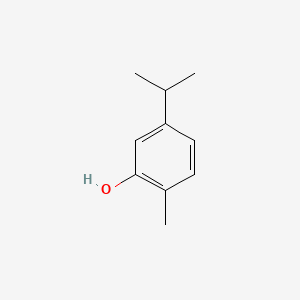
|
Carvacrol |
Carvacrol is a lipid of Prenol Lipids (PR) class. Carvacrol is associated with abnormalities such as Consumption-archaic term for TB, Disintegration (morphologic abnormality), Infection, Corn of toe and Candidiasis of vagina. The involved functions are known as Stereochemistry, Anabolism, Oxidation, Process and Binding (Molecular Function). Carvacrol often locates in Skin, Nerve Tissue, Membrane, Endothelium and Plasma membrane. The associated genes with Carvacrol are P4HTM gene, TRPV3 gene, TRPV1 gene, TRPV2 gene and TRPV4 gene. The related lipids are Fatty Acids, Lipopolysaccharides, Octanols, Micelles and butyrate. |
1535 |
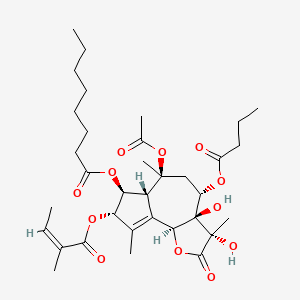
|
Thapsigargin |
Thapsigargin is a lipid of Prenol Lipids (PR) class. Thapsigargin is associated with abnormalities such as Impaired glucose tolerance, Obesity and Blood Pressure Disorders. The involved functions are known as Phosphorylation, establishment and maintenance of localization, Regulation, Metabolic Inhibition and Proteolysis. Thapsigargin often locates in Mouse Skin, Cytoplasm, Skin, Protoplasm and Mitochondria. The associated genes with Thapsigargin are ERBB4 gene, F11 gene, CA1 gene, TRNAP1 gene and HSPA5 gene. The related lipids are taurolithocholic acid 3-sulfate, Liposomes, Fatty Acids and stearylamine. The related experimental models are Mouse Model. |
8868 |
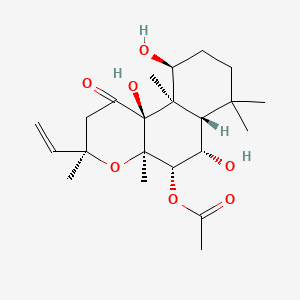
|
forskolin |
Forskolin is a lipid of Prenol Lipids (PR) class. Forskolin is associated with abnormalities such as Cholestasis, Vocal cord dysfunction familial, Hypothyroidism, Renal tubular disorder and Disintegration (morphologic abnormality). The involved functions are known as Cell Proliferation, Anabolism, mRNA Expression, Agent and Signal. Forskolin often locates in Extracellular, Body tissue, Skin, Tissue membrane and Membrane. The associated genes with forskolin are P4HTM gene, SLC33A1 gene, NR1I2 gene, Genes, Reporter and CYP3A gene. The related lipids are Steroids, steroid sulfate, Fatty Acids, LYSO-PC and Lipopolysaccharides. |
24755 |
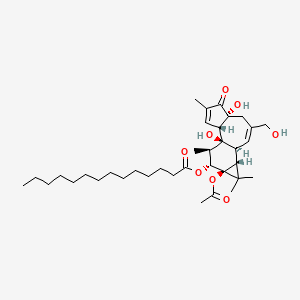
|
phorbol 13-acetate 12-myristate |
Phorbol 13-acetate 12-myristate is a lipid of Prenol Lipids (PR) class. The involved functions are known as DNA Fragmentation, Phosphorylation and Irritation. Phorbol 13-acetate 12-myristate often locates in low-density lipoprotein particle. The associated genes with phorbol 13-acetate 12-myristate are FPR1 gene and ABCB1 gene. |
40921 |
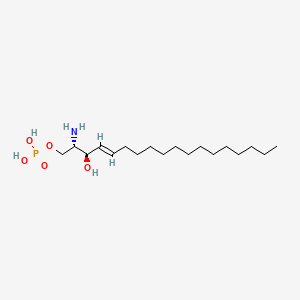
|
Sphingosine 1-phosphate |
Sphingosine 1-phosphate is a lipid of Sphingolipids (SP) class. Sphingosine 1-phosphate is associated with abnormalities such as Infection, Painful Bladder Syndrome, Atherosclerosis, Hyperglycemia and Rheumatoid Arthritis. The involved functions are known as Phosphorylation, Regulation, enzyme activity, Energy Absorption and Vascular Permeability. Sphingosine 1-phosphate often locates in Endothelium, Tissue membrane, Vascular System, Protoplasm and Microfilaments. The associated genes with Sphingosine 1-phosphate are MBTPS1 gene, FBXL15 gene, TEK gene, NTRK1 gene and Gene Family. The related lipids are Promega, Lipopolysaccharides, lysophosphatidic acid, Lysophosphatidylcholines and Lysophospholipids. The related experimental models are Knock-out, Mouse Model, Transgenic Model, Disease model and Experimental Autoimmune Encephalomyelitis. |
2005 |
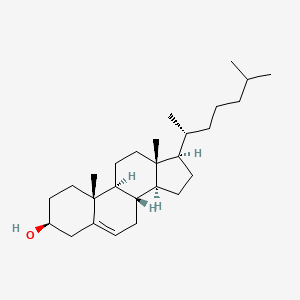
|
cholesterol |
cholesterol is a lipid of Sterol Lipids (ST) class. Cholesterol is associated with abnormalities such as Trypanosomiasis, Chagas Disease, Cleft Palate, Chondrodysplasia punctata 2, X-linked dominant and Child syndrome. The involved functions are known as Blood Circulation, Sterol Biosynthesis Pathway, Receptor Mediated Endocytosis, Methylation and Signal. Cholesterol often locates in Animal tissue, Blood, Membrane, Plasma membrane and peroxisome. The associated genes with cholesterol are MBD2 gene, SIM, SLC33A1 gene, Genome and NSDHL gene. The related lipids are Sterols, zymosterol, fecosterol, Total cholesterol and 7-dehydrocholesterol. The related experimental models are Mouse Model, Knock-out, Genetically Engineered Mouse and Disease model. |
98461 |
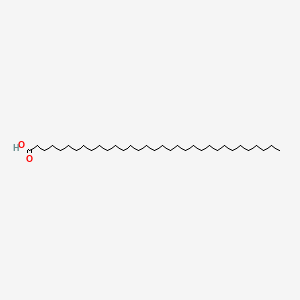
|
tritriacontanoic acid |
tritriacontanoic acid is a lipid of Fatty Acyls (FA) class. Tritriacontanoic acid is associated with abnormalities such as hypercholesterolemia, Metabolic syndrome, Diabetes Mellitus, Non-Insulin-Dependent, Diabetes Mellitus, Insulin-Dependent and Parkinson Disease. The involved functions are known as Fermentation, Process, Longterm Effects, Pressure- physical agent and Lipid Metabolism. Tritriacontanoic acid often locates in Blood, Tissue fiber and A Fibers. The associated genes with tritriacontanoic acid are STN gene. The related lipids are Total cholesterol and blood lipid. |
501 |






